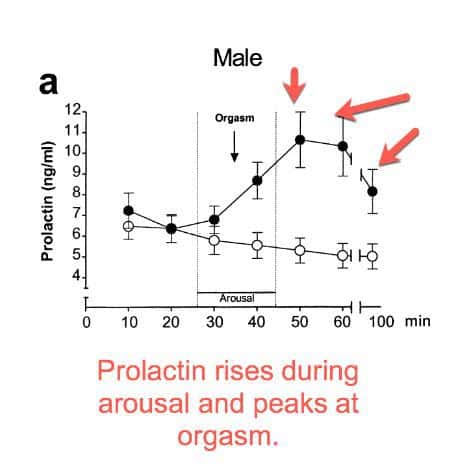
[cmamad id=”11862″ align=”center” tabid=”display-desktop” mobid=”display-desktop” stg=””]
One of the puzzles about sexual dysfunction has to do with loss of interest. Either low libido in general, or loss of interest after orgasm.
The key to low libido and loss of interest seems to be tied up with the hormone prolactin. Prolactin levels shoot up after orgasm, whether it’s from masturbation or from partner sex.

So during arousal, prolactin increases. At orgasm it increases even more.

The study that produced this chart actually looked at partner sex rather than masturbatory sex. It’s not that easy to find couples willing to have sex in a laboratory, so there are not many studies like this.
This chart shows prolactin levels that start at 5 or 6 rising to 10 or 11 following orgasm. And finally coming back down an hour or so later.
Orgasm is followed by a pronounced and long-lasting secretion of prolactin. Prolactin may play a role in the acute regulation of further sexual arousal.
So, why do we care about this? What effect does prolactin itself have on a man’s sex life? Check out this study:

In this study, the researchers gave some men extra prolactin and others a drug that lowers prolactin levels. They had the participants masturbate to orgasm and measured their sexual responses.
[cmamad id=”11863″ align=”center” tabid=”display-desktop” mobid=”display-desktop” stg=””]
So first let’s talk about the men who had been injected with extra prolactin. All of their measured parameters were lower.
Everything was worse for them: Lower sexual drive, lower arousal, worse orgasm, and longer refractory period (the recovery time between when a man has orgasmed, and when he is ready for sex again.)
But the men who were given the drug that lowered their prolactin had much higher sex drive, much higher arousal, much better orgasms, and a shorter refractory period.
These findings may offer a new pharmacological approach for the treatment of sexual disorders.
Now, the drug that was used to lower prolactin is a common drug, or, really, is a family of drugs that includes bromocriptine, metergoline, and lisuride.

Some of these drugs have been around long enough that their effects, including long-term effects, are quite well understood.
If you take these drugs under the supervision of your doctor, and you do have high prolactin levels, you will probably find your sex drive increases and everything else about your sexual response improves. It’s not going to give you good erections if you don’t have them already, but it will just improve things.
In this study these these drugs were given to both men and women who had high prolactin resulting in low sexual interest, low arousal, and low sexual performance.
All three drugs used were highly effective in lowering prolactin levels and restoring sexual function in the majority of patients.
Note: This dramatic improvement in sexual function was observed in both the male and the female participants.
If you suffer from sexual issues (including low sex drive), and nothing else works for you, discuss this option with your doctor before you consider testosterone therapy. Get a blood test to check your prolactin levels and find out if it’s appropriate for you to try out one of these drugs.
All three are pretty safe. Lisuride is difficult to get these days but bromocriptine is quite available.

http://www.sciencedirect.com/science/article/pii/S0149763401000367
Effects of acute prolactin manipulation on sexual drive and function in males
http://joe.endocrinology-journals.org/content/179/3/357.short
Treatment of hyperprolactinemic states with different drugs: a study with bromocriptine, metergoline, and lisuride
https://www.ncbi.nlm.nih.gov/pubmed/7199483

One of the puzzles about sexual dysfunction has to do with loss of interest. Either low libido in general, or loss of interest after orgasm.